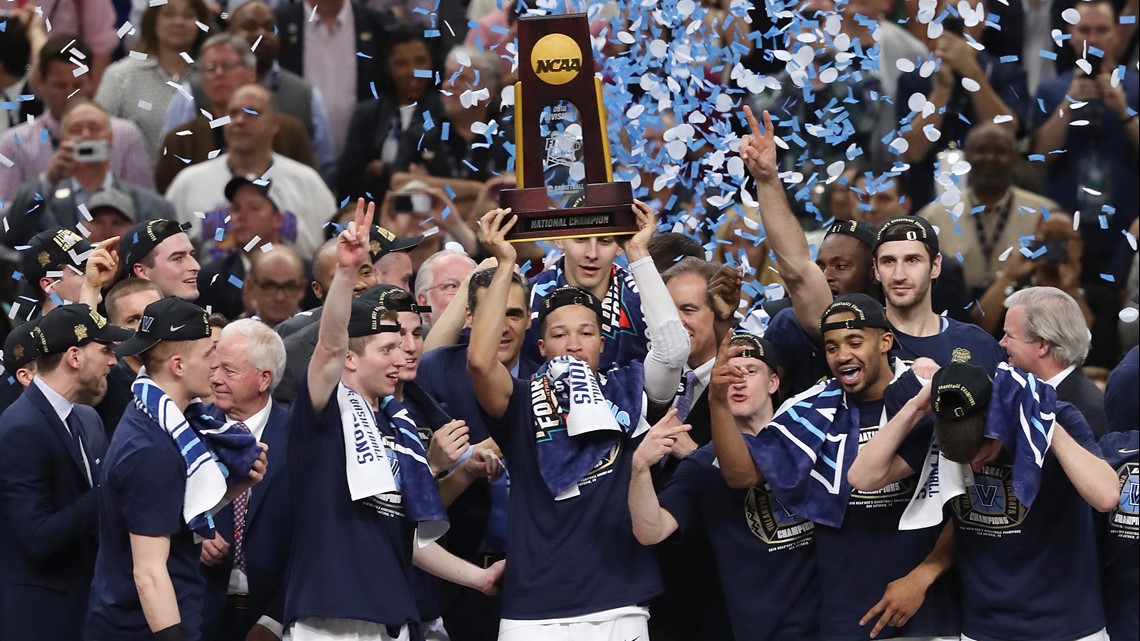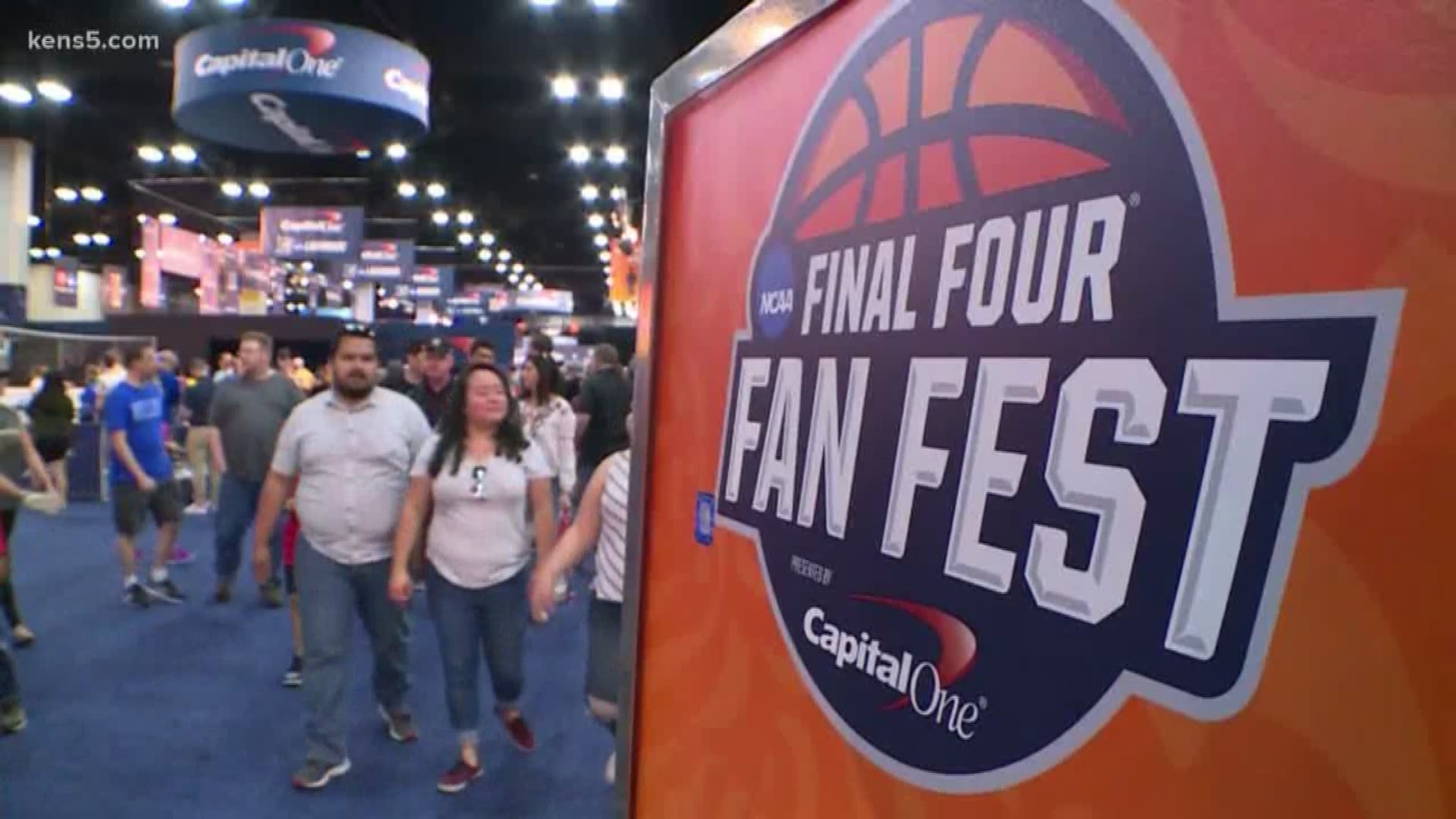Savoring the rousing success of college basketball’s signature event at the Alamodome three and a half months ago, a San Antonio delegation led by Mayor Ron Nirenberg was in Boston on Tuesday to present the city’s bid to host the Final Four for a fifth time.
San Antonio got high marks from many among the more than 70,000 tourists who were in town for the Final Four this spring. One of the more glowing comments came from ESPN’s Peter Burns, who tweeted that “The Final Four should never go four years without being in San Antonio.”
The NCAA will announce the sites for its men’s Final Four basketball tournaments for 2023, 2024, 2025 and 2026 at 2 p.m. Monday. San Antonio bid for every year except 2024 because there’s a major tech conference scheduled at the Alamodome on the weekend of the Final Four. San Antonio is also in contention for the 2021 women’s basketball Final Four.
Although San Antonio was lauded after this spring’s men’s Final Four, members of the delegation that made the city’s pitch in Boston aren’t taking anything for granted.
“There’s been a lot of anxiety since last Tuesday when we walked out of the presentation room,” Jenny Carnes, executive director of the San Antonio Local Organizing Committee, said Sunday. “I haven’t slept much.”
Given the success of this year’s Final Four, San Antonio will be difficult to pass up – even if the Alamodome is 25 years old and doesn’t have the amenities that the country’s newer sports stadiums can boast about.
The two Final Four semifinal games on Saturday, March 31, drew a crowd of 68,257, the largest for a sporting event at the Alamodome. Two nights later, Villanova beat Michigan for the national championship before 67,831.
Final Four events outside the Alamodome also had large crowds. The March Madness Music Festival drew 145,000, and 52,669 attended the Final Four Fan Fest at the Convention Center.


While San Antonio has hosted more Final Fours than any other Texas city, Carnes has no illusions about the stiff competition it faces.
“It’s the fans’ favorite, it’s the athletes’ favorite, it’s the coaches’ favorite,” Carnes said of the Alamo City. “This is where people want to be. You’d like to think that is a big factor in the vote but, again, that remains to be seen.”
Carnes and Mary Ullman Japhet, chairwoman of the public relations committee for the 2018 Final Four, said they are “cautiously optimistic” about San Antonio’s chances of landing another Final Four in this cycle.
“We feel incredibly positive, having come off a wonderfully successful men’s Final Four,” said Japhet, who is senior vice president of communications for San Antonio Sports. “In many respects, the most successful ever. But never for a moment would we take that for granted. We had a wonderful experience. It was exciting to get terrific feedback from the fans, from the coaches, from the NCAA members themselves, but we know how competitive this is.
“We have lost in these rounds before. We know that it is going to consistently be a very competitive environment and can’t rest on our laurels. We have to put forth a very strong bid and we feel that we did. The best term is cautiously optimistic.”
San Antonio and six other cities – Dallas-Fort Worth, Detroit, Houston, Indianapolis, Los Angeles and Phoenix – are competing for the four Final Fours in this cycle. Detroit is the only city that bid for all four years. Dallas bid for every year but 2026, and Houston bid for 2023 and 2025.
“I would say I’m cautiously optimistic,” Carnes said. “I feel like we had a strong bid. The right people were in the room. We presented very well on behalf of the city. But that really wasn’t our pitch. Our pitch was March 29 through April 2, and we delivered a very, very successful Final Four for the NCAA.
“I feel really good about that, but there are always a lot of factors. You don’t know what the factors are. You don’t know what they’re looking at. You don’t know what the other cities are doing. They may be writing a bigger check or giving more enhancements and incentives to the NCAA. They’ve already voted. It’s already done. We’ve done all we can do. We’ll hope for the best. Whatever happens, we know that we did our best.”
San Antonio’s 10-member delegation in Boston last week also included City Manager Sheryl Sculley, Frost bank president Pat Frost and UTSA president Taylor Eighmy.
San Antonio hosted the men’s Final Four in 1998, 2004 and 2008, but had to wait 10 years before being part of the event again. The city was shut out after bidding in 2008 to be a host city in a four-year cycle that started in 2012 and ended in 2015.
“I still feel that pain,” Carnes said. “It was very similar to where we are now, coming off what we thought was a pretty darned good Final Four in ’08. A little bit of our fault. We took it for granted that we were doing it every four years. We just felt like we were going to get another one – and we didn’t.”
Stung by the NCAA’s rejection, city leaders rolled up their sleeves and devised a strategy to return the Final Four to San Antonio. They started with the Alamodome, which underwent $60 million in improvements. The facelift included the construction of a media center and 14 temporary luxury suites, the widening of concourses in the building and new video boards.
The strong community effort bore fruit when the NCAA awarded San Antonio the 2018 Final Four in November 2014. The result was arguably one of the best Final Fours in the event’s history.
“This was, by far, my favorite (Final Four) for a couple of reasons,” Carnes said. “People used to say, ‘What do you think your biggest challenge is going into hosting again in’18?’ And I’d say, ‘Doing it with kids this time, for one (Carnes has two daughters, ages 6 and 2).’ The event was so much bigger in so many different ways, from security to standards and protocol to just sheer numbers of peopled that were coming both for the games and the auxiliary events.
“What our team was able to pull off in a city and a stadium that doesn’t have an NFL team, it doesn’t host 68,000-people events every Sunday, I was so proud of the way we performed. It was no doubt, no question, a huge success for us. By far, the best that we’ve ever hosted."

